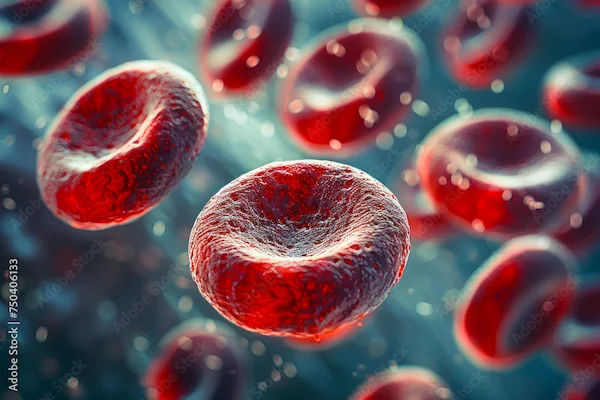Understanding High Haemoglobin Count: Causes, Symptoms, Risk Factors and Management
Explore the risks, causes, symptoms, and treatment options for high haemoglobin count. Learn about managing and monitoring high haemoglobin levels for better health outcomes.

Written by Dr.Sonia Bhatt
Last updated on 3rd Jul, 2025

Introduction
Haemoglobin is made up of a protein called globin and a compound called heme. It is a protein in red blood cells that carries oxygen from the lungs to the tissues of the body and helps transport carbon dioxide back to the lungs. Haemoglobin contains iron, which gives red blood cells their colour and allows them to bind to oxygen. It has a high affinity for oxygen in the arteries and a low affinity for carbon dioxide.
What is a High Haemoglobin Count?
High haemoglobin (Hgb) count, also known as polycythaemia, occurs when red blood cells have an unusually high amount of the blood protein haemoglobin.
Typically, the normal haemoglobin levels are:
Women: 12.1 to 15.1 grams per decilitre (g/dL)
Men: 13.8 to 17.2 g/dL
Children: 11 to 16 g/dL
Values above these ranges may indicate an underlying condition or a physiological response to external factors. Understanding the causes and implications of high haemoglobin levels is essential for managing the condition effectively. Adequate haemoglobin levels are crucial for maintaining overall health and ensuring that the tissues of the body receive sufficient oxygen to function optimally.
What are the Causes of a High Haemoglobin Count?
High haemoglobin levels can be caused by a number of conditions and lifestyle factors.
1. Common Medical Conditions Causing Polycythaemia
Many medical conditions can result in a higher haemoglobin level, such as:
Chronic Obstructive Pulmonary Disease (COPD): Low oxygen levels due to lung diseases can elevate haemoglobin levels.
Kidney Tumours: Certain tumours can produce excess erythropoietin, which is a hormone that stimulates red blood cell production.
Congenital Heart Disease: Structural heart defects present from birth can lead to higher haemoglobin levels.
Polycythaemia Vera: This is a rare bone marrow disorder that may cause the overproduction of red blood cells.
2. Lifestyle Factors that may contribute to Higher Haemoglobin Levels
Non-medical factors can also cause a rise in haemoglobin levels, such as:
Dehydration: Reduced plasma volume can make haemoglobin concentration appear higher.
Use of Anabolic Steroids: These lead to an increase in red blood cell production.
Smoking: This reduces oxygen levels in the blood, prompting the body to produce more haemoglobin.
Living in High Altitudes: Lower availability of oxygen at higher altitudes stimulates increased haemoglobin production.
Symptoms of a High Haemoglobin Count
High Haemoglobin levels usually do not cause any symptoms. In case symptoms are present, the common physical signs may include the following:
Fatigue
Dizziness
Blurred vision
Headaches
Itchy skin, especially after a hot shower
Flushed complexion
Psychological and Cognitive Symptoms may include:
Mood swings
Anxiety or irritability
Difficulty concentrating
Risk Factors of High Haemoglobin Levels
Below are a few risk factors associated with high haemoglobin levels:
1. Environmental and Occupational Risks
Environmental and occupational risks may include:
Occupational Hazards: Jobs that involve exposure to low-oxygen environments, such as miners and pilots, may increase the risk.
Exposure to Carbon Monoxide: Common in certain industrial jobs or from environmental pollution, exposure to carbon monoxide can lead to increased haemoglobin levels as the body compensates for reduced oxygen.
2. Genetic Predispositions
A few individuals may be genetically predisposed to higher haemoglobin levels. Conditions like polycythaemia vera are often linked to mutations in the JAK2 gene, which can lead to abnormal blood cell production.
Diagnostic Methods for High Haemoglobin Count
Diagnostic methods for high haemoglobin count may include:
Complete Blood Count (CBC): This test measures the concentration of haemoglobin and other components in the blood.
Oxygen Saturation Test: This helps in assessing how well oxygen is being transported in the blood.
Erythropoietin Test: This test helps determine the level of erythropoietin, which can indicate if the high haemoglobin is due to an underlying condition.
Bone Marrow Biopsy: This may be performed if a bone marrow disorder is suspected.
Interpretation of the test results includes comparing haemoglobin levels to standard ranges and evaluating other markers such as red blood cell count and haematocrit levels. Additional tests may be required to identify underlying causes.
Get Tested for Dengue
Potential Complications of Untreated High Haemoglobin Levels
High haemoglobin levels can thicken the blood and may increase the risk of cardiovascular issues such as:
Stroke
Heart attach
Hypertension (high blood pressure)
It may also lead to blood clots and other serious conditions, increasing blood viscosity, which can lead to:
Pulmonary embolism
Deep vein thrombosis (DVT)
Increased risk of bleeding complications despite the thickened blood
When to See a Healthcare Provider?
Though occasional headaches or dizzy spells are common and often harmless, it becomes essential to consult a healthcare provider if these symptoms become frequent or unusually severe. Consistency in these symptoms could signal an underlying health issue that may need proper attention. Additionally, seeking medical advice becomes crucial if an individual notices any other symptoms linked to conditions that cause high haemoglobin levels, such as shortness of breath, vision issues or fatigue. Early intervention can help individuals identify potential health concerns and guide appropriate treatment.
Treatment Options for High Haemoglobin Count
Treatment options may include medications as well as other procedures.
1. Medications and Medical Treatments
Treatment depends on the underlying cause:
Oxygen Therapy: It is for those with lung conditions to improve oxygen levels and reduce haemoglobin production.
Medications: Hydroxyurea or other medications can help in reducing red blood cell production.
Addressing Underlying Conditions: Managing heart and kidney diseases that may contribute to higher haemoglobin.
2. Other Procedures and the Role of Phlebotomy
Other procedures include:
Bone Marrow Treatment: In cases of polycythaemia vera, treatment may involve targeted therapies to control bone marrow activity.
Phlebotomy: It helps regularly remove blood to reduce haemoglobin levels and decrease blood thickness.
Management of High Haemoglobin Levels
Dietary recommendations for managing high haemoglobin levels include:
Limiting Iron-Rich Foods: Reducing dietary iron can help in managing haemoglobin levels if recommended by a healthcare provider.
Avoiding Alcohol and Tobacco: Both can have negative impacts on blood health.
Staying Hydrated: Proper hydration helps maintain optimal blood volume and haemoglobin concentration.
For managing higher haemoglobin levels, individuals can also choose to do the following:
Regular Exercise: Moderate exercises can help improve blood circulation, but they should be balanced to avoid excessive strain.
Avoid High-Altitude Activities: Limiting exposure to high altitudes can help stimulate haemoglobin production.
Monitoring and Importance of Regular Check-Ups
Regular monitoring is essential to ensure haemoglobin levels remain within a safe range. Routine blood tests and follow-ups may help individuals track progress and adjust treatment plans accordingly. With proper management, individuals with high haemoglobin can lead healthy lives. Long-term strategies include adhering to medical treatments, maintaining a healthy lifestyle and avoiding risk factors that may exacerbate the condition.
Conclusion
High haemoglobin count or polycythaemia can result from various medical conditions and lifestyle factors. It may initially present individuals with mild symptoms, but untreated high haemoglobin can lead to serious health complications such as blood clots and cardiovascular issues. Hence, early diagnosis and effective treatment are crucial, and lifestyle modifications are key to managing the condition. Managing high haemoglobin levels is vital in maintaining overall health and preventing severe complications. Therefore, staying informed, seeking regular medical advice and making necessary lifestyle changes are key to effectively controlling haemoglobin levels and leading healthier lives.
Consult Top Haematologists
Consult Top Haematologists

Dr. Sonal Paul
Haematologist
9 Years • MBBS, MD Pathology, DM Clinical Haematology
Kolkata
SATKRIT HEALTHCARE - A MULTISPECIALITY CLINIC, Kolkata

Dr.sanchayan Mandal
Oncologist
17 Years • MBBS, DrNB( MEDICAL ONCOLOGY), DNB (RADIOTHERAPY),ECMO. PDCR. ASCO
Kolkata
Dr. Sanchayan Mandal Oncology Clinic, Kolkata
Dr Sumanth R
General Physician
2 Years • MBBS
Bengaluru
PRESTIGE SHANTHINIKETAN - SOCIETY CLINIC, Bengaluru

Dr. Thorana Prakash M
General Physician
2 Years • MBBS
Bengaluru
PRESTIGE SHANTHINIKETAN - SOCIETY CLINIC, Bengaluru

Dr Abilash Jain
General Physician/ Internal Medicine Specialist
12 Years • MBBS,DNB(FM),MNAMS,FIAMS,CCGMG(GERIATRICS),DGM (GERIATRICS),PGCD(DIABETES,BOSTON UNIVERSITY),FID(DIABETICS UK)CCEPC(PALLIATIVE CARE),CCCC(CRITICAL CARE)
Visakhapatnam
Apollo Clinic Vizag, Visakhapatnam




